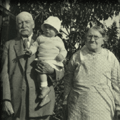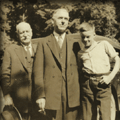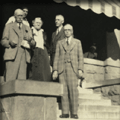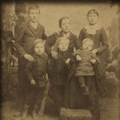
|
|||||||||
|
Dimock Fancourt Green Hutton Lort of Birmingham Lort of Pembrokeshire Lorts Unlinked James McIntire John McIntire of Ohio Mitchell Plant Rolston Sterret Williams
edited by Llwelynn Jewitt.
William Dewson "Beaver" Lort
by Ross Anthony Lort.
Bull, Joseph Bushby, Gertrude Mary Cheshire, Eliza Dixon, Marion Fancourt, William Green, Emma Green, George Green, Sarah Lort, John Anthony Hutton Lort, Ross Anthony Lort, Thomas Arthur Hutton Lort, William McIntyre, Charles Sr. McIntyre, Charles Jr. McIntyre, Edward Bennett McIntyre, Harry McIntyre, Robert Michell, Bernard S. J. W. Michell, David Sutherland Michell, George Babington Michell, George Dalton Michell, John Berkeley Mitchell, Joseph Mitchell, William Plant, Florence Eliza Rolston, Cecilia Marion F. Rolston, John Michell Rolston, Peter Williams Spain, Valentine S. Sterret, Della Sterret, John
|

A few notes from a letter written by Ed to Harry in 1936:
Great-grandfather was John McIntire. Lived in Ohio. Was a whell-wright.
The following is from a letter written by Harry to Ed in 1952. Harry had kept a carbon copy of the typewritten letter. "You inquired whether I have any notes on Dad's early history. When I visited Mother and Dad in 1923, I thought it would be interesting to jot down some of this history first hand as he narrated it. It was a longer task than I had anticipated, but I made some progress. Here it is: Charles McIntire, Sr. Born Knox County, Illinois, 1843.His father, John H. born in Ohio. His mother, Betsy Elizabeth Long born in Ohio near Virginia Line. Pa lived in Knox county until the age of four. Moved to Peru, Illinois, until 14 - 15 years old. Moved to Duquoin, Ill. Moved to Bloomington, Ill., where he enlisted in 1862, in august, age 18, in Company G, 129 Infantry, Illinois Volunteers. First camp out of Illinois was at Lousville, Kentucky. No battles in Army. Transferred to Navy in '63 - '64. Principal engagement was at Fort Morgan in Mobile Bay. Ordinary seaman on Monitor Chicasaw (double turret). Next engagement was with Rebel ship Tennessee Ram. Discharged in New Orleans 1865. Back to Pontiac, Illinois. Married February 22, 1869, at Oregon, Missouri, to Della Sterrett. Farmed in Nebraska. Moved to Omaha - tin shop and temaing. In 1871 to San Francisco, California, then to Marysville, California. Worked as tinsmith. Left wife with her mother. Then to Omaha - back to Missouri to buy cattle. Snowbound in 1872. Livery business in Columbus, Nebraska. Elk trained to drive. Stayed on farm until 1878. then to Columbus in 1879. To Hopkins in 1881. That is as far as I got. It would be interesting to have more of his life history. Such interesting and loving parents. They were very kind. I asked him once, "How come you can quote so many passages in the Bible?" He replied that when he was homesteading that farm in Nebraska - 20 miles from the nearest town and a mile to the nearest neighbour's house - all he had to read most of the time was the Almanac and the Bible. Here is some other family history which I later jotted down on the same sheet of paper which contained Dad's early life history:
John born 1869 died 1904 (35)
(n.b. some of these dates were added later by my mother - C.A. Lort) Dad would have been 88 years old the following November. I recall his last days - such a hot summer. I remember our taking the windows out of the frames, so he could get a little more breeze. He was such a calm and philosophical father. One day when Fred Herbert came to the house to mix him some egg and whiskey, he asked Fred: "Fred, did you see any hovering angels out around the porch?"
End of Harry's letter
An entry from one of Harry's notebooks: Item in the Hopkins Journal, 1895: "Charles McIntire, north of town, purchased a new Story & Clark organ for his wife, it being bought of D.N. Scott." Reflections of Grandfather McIntyreBy William R. McIntyre No.1 I was a big boy for fifteen, so I lied about my age and enlisted in the Union Navy. The Civil War was raging back and forth. The Union forces gaining here; the Confederate forces smashing back. I was assigned to an old coal-burning cruiser with a very fussy English captain. I became friendly with a Boswain of many years experience at sea. "McIntyre," he would say, "when they call for coaling volunteers, you step right up forward everytime." Now I didn't understand this, because everyone hated the coaling job so much. It was carrying heavy, dirty and greasy sacks of coal from the barges alongside; and dumpint them in the coal shute down to the engine rooms. Of course you became black and sooty from head to foot. Now as I had some experience on river boats, I had been assigned to the crew of the Captain's Gig. Our Captain was an excellent officer and gentleman, and he was a stickler for cleanliness. His Gig had to be kept spotless, decks scrubbed and brasses polished. As it was a warm summer month, he always wore a full white uniform, and all his crew had to do likewise. Now on this particular day a hurry-up call had been made for the Captain's Gig crew to report immediately. He was to meet an important personage on shore. I was on coaling duty and did not get my call soon enough. When I was called, everyone was ready to go. I grabbed a deck scrubbing brush and had on of my friends do the best he could on my uniform. I had no time to change at all. I raced on board the gig and quickly reached one of the tillers at the aft where I was always stationed. FFortunately, the Captain had not seen me. We reached the shore, tied up to the pier, and were there for a couple of hours. Everything seemed to be going well, until the Captain decided to stroll towards the stern of his Gig, where I was stationed. He saw me and asked my name. "Seaman McIntyre, Sir," I said. When we arrived back at our ship I was summoned before the Captain and Chief Officer. The Captain said to the Chief Officer "While he is on my ship, I do not want Seaman McIntyre to work on coaling duties ever again!" "Aye, Aye, Sir," responded the Chief Officer. The Captain gave me ever so slight a smile and walked away. He was a very understanding man. It was then I realized what my friend the Boswain had meant by telling me to volunteer for coaling duties. He had sailed with our Captain on many a trip, and without a doubt had seen a similar incident before.
No. 2 The food on board ship was nourishing but rather bland and monotonous. If the ship was leaving on an evening tide we were allowed a few hours shore leave in the afternoon. Two young Seamen, a little older than myself, and I had become good pals. We had no money, only allowed a little against our final pay at certain times. Now we loved to see the chocolates, cookies, and cakes displayed in some bakery windows. We thought of a way to get some of those goodies without paying. In those days men carried a flat leather wallet with a string around it to hold the contents within. It would also fit in your trouser pocket. We would get a very, very long piece of string and wind it around our one old wallet, putting a few smooth pebbles inside. We all three would go into the shop, preferabley, when he had other customers. We would select a couple bags of cookies, a good size cake, a couple bags of chocolates and a lovely cinnamon apple pie. The cake and the pie were always put in strong cardboard boxes. One of the boys would say out loud, "Pay the man, Johnny, we will wait for you outside." Out they would go carrying all the goodies, while I got the old wallet out and started to unwind the string. Very, very, slowly, even untieing some knots we had placed in it. Finally, coming to the bottom, opening the wallet and shouting - "No money, they must have taken it! Hey! Come back here!" I then went racing out the door to meet at our planned rendezvous!
I always had an eye for the girls, especially those with an attractive figure. During the summer, the household chores became a bit much for my wife and only daughter. With six sons and myself to feed, we decided to hire a girl to board and help out. We applied at the local government employment office, and after a time, a 16 year old immigrant girl from Sweden was sent to us. Her name was Olga Svenson. She was a strong young girl, rather plain looking, but with a wonderful figure. She was a good worker and settled in quite well with my wife and daughter. The boys didn't take much interest in her, as they went into the nearest local town for their amusements. I used to give her the eye every now and then, but only in a jovial way. Until one time, she smiled back in a most provocative way. I decided on action. One night when my wife and everyone was asleep, I crept down the hall to Olga's bedroom. Now the door had a rather loud squeak when opened. I had menat to oil the hinges, but hadn't gotten around to the job. So I thought maybe if I gave the door a quick shove it might not squeak, Here goes a try! My goodness, what a racket! Pots and pans and glass jars all came tumbling down. People appeared as I stood in the doorway shouting, "Burglars, Burglars! I hear burglers up here!" I don't know if anyone believed me, but then I was the head of the household protecting my flock, so nothing was said. I must have misunderstood Olga's smile, as she had placed a chair agains tthe door, loaded with pots, pans and jars. Oh well, maybe next time?
The "Muster and Descriptive Roll of Company 'G'" shows Charles McIntire as being 19 years of age; 5' 10 1/2" tall; brown hair; blue eyes; Light complexion; Single; a tinsmith; from Knoxville, Knox County, Illinois; Joined for service and enrolled on August 5, 1862 and Mustered into service on September 8, 1862.
129th Illinois Infantry The ONE HUNDRED AND TWENTY-NINTH INFANTRY was organized at Pontiac in August, 1862, by Colonel George P. Smith, and was mustered into the United States service September 8. Five companies were from Livingston county, four from Scott county and one from Rock Island county. On the 22d of September the Regiment left Pontiac with 927 officers and men, and reported at Louisville, Ky. On October 3, marched in pursuit of Bragg, via Frankfort and Danville, to Crab Orchard. On 17th, the Brigade was transferred to Tenth Division, Brigadier General R. S. Granger commanding. Commenced the return march October 20, and moved, via Danville, Perryville and Mumfordsville, to Bowling Green. On 21st November, the One Hundred and Twenty-ninth was sent as garrison to Mitchellville, Ky. From the middle of December 1863, till the first of June 1864, the One Hundred and Twenty-ninth guarded the Railroad from Bowling Green, Ky., to Gallatin, Tenn., during which time it had frequent collisions with the rebels in repelling their attack on the railroad. From the 1st of June till the 22d of August, it garrisoned Fort Thomas at Gallatin, which was threatened by Morgan and his entire command who approached to within about 8 miles of the works, and then thinking discretion the better part of valor the celebrated General beat a retreat. On the 22d of August, it took up the line of march for Nashville, and remained there in garrison till the 24th of February 1864; then took the line of march for Wauhatchie Valley arriving about the middle of March. Previous to this it was assigned to the First Brigade of the Third Division of the Twentieth Corps. On May 3d, it left with Sherman's grand army for Atlanta. On the march it participated in the battles of Resaca, Buzzard's Roost, Lost Mountain, Dallas, Peach Tree Creek and Atlanta. From the latter place it started upon the grand march to the sea, and bore its share in that and in the subsequent campaign in the Carolinas. It took a conspicuous part at Averysboro and Bentonville. At the conclusion of this campaign the Regiment marched to Washington and participated in the national review there. From thence it proceeded to Chicago where it arrived the 10th of June 1865, when it received final payment and discharge.
Illinois Adjutant General's Report
This web site is designed and maintained by Charles Anthony Lort.
email: tony@lort.ca |
||||||||







